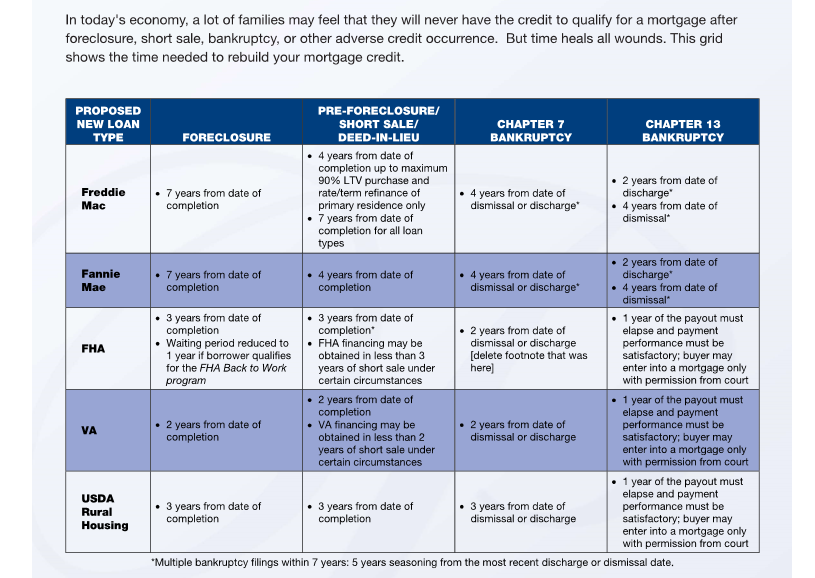Kentucky FHA Loan Guidelines for Bankruptcy and Foreclosure
📘 Chapter 13 Bankruptcy Mortgage Questions
How long after a Chapter 13 bankruptcy can I get a mortgage?
You may be eligible after 12 on-time payments during your repayment plan (with court approval), or immediately after discharge with FHA, VA, or Non-QM options.
What types of mortgage loans are available during or after Chapter 13?
FHA, VA, USDA, Conventional (after 2 years discharge), and Non-QM Portfolio Loans.
What is your waiting period for an FHA loan after bankruptcy?
FHA typically allows for approval during Chapter 13 (after 12 payments with approval) or immediately after discharge.
What kind of interest rate should I expect?
Rates depend on credit recovery and loan type. Expect slightly higher-than-average rates during early post-bankruptcy stages, with the potential for competitive terms.
What are the most common obstacles after discharge?
Low credit scores, high DTI ratios, limited assets, incomplete documentation, or lack of court approval.
How long does it take to refinance after Chapter 13 discharge?
Typically 2–4 weeks if all documents are ready.
How long does it take to purchase after Chapter 13 discharge?
Often 30–45 days from pre-approval to closing.
Can I purchase a home while still in Chapter 13?
Yes, with 12 months of on-time payments and court/trustee approval.
Can I refinance my mortgage during Chapter 13?
Yes, under certain conditions and with approval from the bankruptcy court.
How long does it take to get approved during a Chapter 13 payment plan?
Typically 45–60 days including court approval, but may vary by case and jurisdiction.
Can I do a cash-out refinance after Chapter 13?
Yes, usually available 6–12 months post-discharge if equity and credit conditions are favorable.
Are there any mortgage offer loans for homeowners who own their home outright after bankruptcy?
Yes. Rate-and-term and cash-out refinances may be available depending on credit and income.
Are there low down payment loan options post-Chapter 13?
Yes. FHA (3.5% down), VA (0% down), USDA (0% down), and KHC programs are available.
What credit score is needed after Chapter 13?
FHA 580 with 3.5% down FHA and 500+ score with 10% down payment, VA: no minimuim score but 620 preferred USDA: no minumum score but 640 preferred, Conventional: 620+, Non-QM: 500–550+
What if I don’t qualify right now?
You’ll receive a custom action plan to build credit, savings, or income toward qualification.
How do student loans affect mortgage eligibility after bankruptcy?
Student loans count toward your DTI. Deferred loans typically calculated at 0.5%–1% of the balance.
Where can I find forms to file for Chapter 13 Bankruptcy?
Forms are available via the U.S. Bankruptcy Court website or through a licensed bankruptcy attorney.
How does divorce affect my Chapter 13 plan?
Divorce can affect repayment and income stability. Plan modifications may be needed through court.
📙 Chapter 11 Bankruptcy Mortgage Questions
```What mortgage options are available after Chapter 11 bankruptcy?
Loan types vary based on personal vs. business bankruptcy. FHA, VA, and Non-QM may apply post-discharge.
What if I don’t qualify today?
You’ll receive a recovery plan tailored to reestablish eligibility.
When can I apply for a loan post-Chapter 11?
After your plan is confirmed or the bankruptcy is discharged—typically 12–24 months depending on the loan.
📗 Chapter 7 Bankruptcy Mortgage Questions
```How long must I wait after Chapter 7 to get a mortgage?
FHA/VA: 2 years, USDA: 3 years, Conventional: 4 years, Non-QM: as little as 1 day post-discharge.
What loan options are available post-Chapter 7?
FHA, VA, USDA, Conventional, and Non-QM—all with different credit and timeline requirements.
Are there extra fees for Chapter 7 borrowers?
No hidden fees. Standard lender fees apply. Review your Loan Estimate for details.
Do you offer loans for mobile homes on past Chapte7 or Chapter 13?
Yes—if the home is on a permanent foundation and meets agency/HUD guidelines.





 Email -
Email - Call/Text -
Call/Text - 
 Email -
Email - Call/Text -
Call/Text -  Website:
Website:  Address: 911 Barret Ave., Louisville, KY 40204
Address: 911 Barret Ave., Louisville, KY 40204



